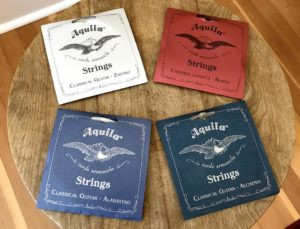Choosing the right set of classical guitar strings can significantly impact your playing experience and the sound of your instrument. With countless options available, finding the best strings for your classical guitar can feel overwhelming. Are you searching for strings that deliver a warm, mellow tone, or do you prefer a brighter, moreprojecting sound? Perhaps you’re unsure where to even begin. This guide aims to simplify your search by exploring some of the top-rated classical guitar strings on the market, helping you discover the perfect match for your guitar, playing style, and musical preferences.
Understanding the nuances of classical guitar strings is crucial. The “best” string isn’t a universal concept; it’s deeply personal and depends on a variety of factors. A string that sounds incredible on one guitar might not perform as well on another. Similarly, your individual nail shape, playing technique, and even the acoustics of your performance space will influence your string choice. What one player considers “musical” in a string might be entirely different for another. For example, some guitarists might prioritize warmth and smoothness, while others seek brightness, projection, and balanced tones.
If you’re new to the world of classical guitar strings and feeling lost, a great starting point is to opt for a set of reliable, affordable, and traditionally voiced strings. D’Addario Pro Arte (hard tension) is an excellent choice for beginners, offering a balanced sound and comfortable playability. Another slightly more refined option is Augustine Imperial Red, known for its warm tone and enhanced clarity. The most important thing for beginners is to avoid getting bogged down in endless string comparisons. Instead, focus on practicing and developing your technique with a standard set of strings. As you gain experience and develop your ear, you can then begin experimenting with different string types to fine-tune your sound.
Exploring Different Types of Classical Guitar Strings
Classical guitar strings are broadly categorized by their material, each offering distinct sonic characteristics:
-
Nylon Strings: Often considered the standard for classical guitars, nylon strings are known for their warm, round, full-bodied, and smooth sound. They are generally more forgiving and less brittle than other materials, making them a popular choice for students. However, some nylon strings can sound muddy and lack clarity, balance, and precise intonation compared to carbon strings.
-
Composite Strings: These strings utilize materials like titanium and other blends, aiming to bridge the gap between nylon and carbon strings. Composite strings often attempt to address the shortcomings of both materials, offering a balanced tone. While they can provide good balance, some players feel they may lack the distinctive qualities that make nylon and carbon strings so appealing.
-
Carbon Strings: Carbon strings are prized for their brighter, clearer, and more balanced sound. They offer superior intonation and projection compared to nylon strings. Carbon strings can be particularly advantageous in ensemble settings or larger performance venues where projection is crucial. However, carbon strings can be less forgiving and may sound harsh on certain guitars or with specific nail shapes. They are also typically stiffer than nylon strings, which some players may find less comfortable, especially initially.
-
Combo Sets: Recognizing the unique strengths of different materials, many manufacturers now offer combo sets. These sets strategically combine different string types, often using a carbon fiber G string to enhance clarity and balance in the lower-midrange frequencies, while retaining the warmth of nylon for the other strings. This approach aims to achieve a balanced and versatile sound profile.
Top Picks: Classical Guitar String Reviews and Recommendations
Based on experience and general preferences, here are some top-rated classical guitar string sets, with a focus on their characteristics and suitability for different players:
D’Addario Pro Arte

For a reliable and affordable option, D’Addario Pro Arte strings are consistently recommended, particularly for students. Available in normal and hard tensions, these strings offer a warm and forgiving tone, making them excellent for practice and general playing. Hard tension is generally recommended for most students, providing a good balance of playability and projection, but extra-hard tension is usually unnecessary. Pro Arte strings are known for their consistent quality and are a safe bet for players seeking a traditional nylon string sound.
Augustine Imperial Red
Augustine Imperial Red strings represent a step up in quality from basic student strings. They provide a warm and forgiving tone similar to D’Addario Pro Arte but with enhanced clarity and balance. These strings are well-suited for traditional classical guitar repertoire and are a great choice for students and intermediate players seeking improved sound quality without a significant price increase. The Imperial Red set offers a well-rounded sound that works well on a variety of guitars.
Aquila Cristallo
Aquila Cristallo (Hard Tension) strings are a pleasant option for players seeking a mellow nylon string sound with good balance. These strings offer a medium-bodied tone that is warmer than some nylon strings but still maintains reasonable clarity. Cristallo strings are more transparent than some traditional nylon sets, providing a slightly more refined sound while remaining forgiving and comfortable to play.
Aquila Zaffiro
Aquila Zaffiro strings offer a balanced sound profile that bridges the gap between nylon and carbon strings. These strings provide more clarity and projection than typical nylon strings, with improved intonation. While not as sweet-sounding as pure nylons or as brilliant as carbons, Zaffiro strings bring out the woody character of the guitar and offer a unique tonal quality that can be desirable in certain musical contexts. They are a good option for players seeking a balanced sound with a touch of warmth and clarity.
Savarez Corum Alliance
Savarez Corum Alliance strings are an excellent choice for ensemble playing, performing in large halls, or when you need enhanced clarity and projection. These strings are brighter and stiffer than nylon strings, offering superior intonation and projection. If your guitar sounds overly warm or lacks projection, Corum Alliance strings can significantly brighten and clarify the sound, making the guitar come alive. However, be mindful of their stiffness, which might be less comfortable for players with hand issues. Also, the high E string can be quite bright and intense, which may not suit all guitars or playing styles.
La Bella 2001 Classical Guitar Strings
La Bella 2001 Classical Guitar Strings (medium tension) are nylon strings known for their warm and full sound. They offer a slightly thicker feel than D’Addario nylons and are comparable to Savarez New Cristals but perhaps with a fuller tone and less edge. If you prefer a traditional nylon string sound with a robust and warm character, La Bella 2001 strings are a great option. The basses are particularly full-sounding and balance well with the trebles, providing a cohesive and rich overall tone.
Choosing the Right Strings for You
Ultimately, the best classical guitar strings for you will depend on your individual preferences, your guitar, and the musical styles you play. Experimentation is key to finding your perfect match. Consider the following factors when making your choice:
- Your Guitar: Different guitars respond differently to various strings. A brighter guitar might benefit from warmer nylon strings, while a darker-sounding guitar might pair well with brighter carbon strings.
- Playing Style and Repertoire: If you primarily play traditional classical repertoire, warmer nylon strings might be ideal. For modern or more projecting styles, carbon or composite strings could be a better fit.
- Personal Preference: Do you prefer a warm, mellow tone or a bright, projecting sound? Do you prioritize comfort or projection? Your personal sonic preferences are paramount.
Conclusion
Selecting the right classical guitar strings is a journey of discovery. While sets like D’Addario Pro Arte and Augustine Imperial Red offer excellent starting points, exploring different materials and brands will ultimately lead you to the strings that best complement your instrument and playing style. Don’t be afraid to try different sets and tensions to unlock the full potential of your classical guitar and refine your unique sound. Happy playing!

